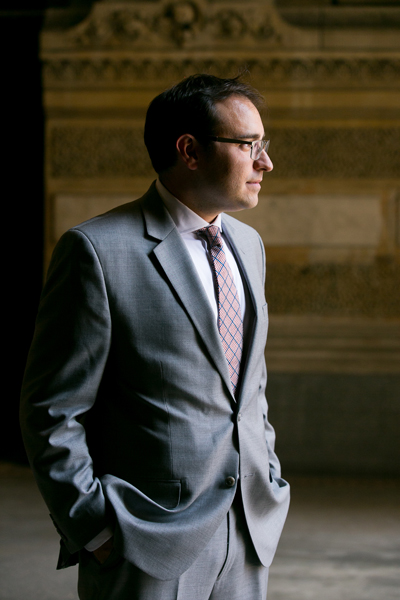photo by Lindsay Docherty
Man with a Plan
by Heather Shayne Blakeslee
Andrew Stober is perhaps best known as one of the architects of Indego, the Philadelphia bike share program, which he helped launch while working as the Chief of Staff at the Mayor’s Office of Transportation and Utilities (MOTU). Now, he’s running as an independent for City Council for one of the two at-large seats reserved for non-majority party candidates. He’s hoping that his planning background will be an asset while a new council and a new mayor set the stage for Philadelphia’s next act.
Stober has witnessed how infrastructure—our roads, bridges, buildings, utilities and public transit—affect us all. “What I’ve loved working on for so long in transportation is, from the least privileged person to the most resourced person, the system touches their lives every day,” says Stober. “[People] will talk your ear off about it.” His observation is no doubt the result of holding many public meetings and impromptu listening sessions during the course of his work in Boulder, C0, and more recently in Philadelphia.
“When you are dealing with infrastructure,” Stober says, “you aren’t dealing with things that are just physical. You are dealing with things that are very emotional.” One topic we discussed is the controversy swirling around about Le Bok Fin, a pop-up bar on the rooftop of a closed vocational school in South Philly that was sold by the Philadelphia School District to a private developer. The temporary use of the building was meant to activate the space and ready it for more extensive redevelopment plans, but the bar has been seen as insensitive to some in the community still grieving the loss of their school.
data-animation-override>
“Stober can see both sides. “The people who are like, ‘This is having a party on a gravestone that we just laid’ are very sincere, and the people who are saying, ‘This is going to be a national model for how we recover beautiful infrastructure that is no longer serving its historical public use’ are coming from an equally sincere place,” he says. “It’s a really great example of just what a powerful symbol our infrastructure is.” ”
He relates the controversy back to the bike share plans, which had a stated goal to make the program affordable and accessible to diverse Philadelphia neighborhoods. Some neighborhoods were leery about becoming a bike share location because they were concerned it signaled that gentrification was on its way. Stober says public outreach was essential in assuring residents that the bikes were intended for their use, not a new stream of neighbors waiting in the wings. “Infrastructure does not have a very savory legacy in the United States as it relates to low-income communities,” he says. “The legacy is either one of ignoring them, or just rolling through them with no regard for community. So, we wanted the introduction of this new piece of infrastructure to be very different in that regard.”
It’s a point he echoes when we switch gears from transportation and urban planning to talk about energy. Stober is clear, for instance, on the pitfalls of blindly following the path of making Philadelphia a petrochemical hub, a proposed plan that would dramatically increase the amount of natural gas refined in the city, and potentially bring the manufacturing of plastics, fertilizers and other known polluters to our already compromised air quality. “We need to have a really clear understanding of what the environmental and health impact of these projects are so we can make an educated decision,” Stober says, “because we don’t want to have a project that creates a few hundred jobs and then tens of millions of dollars in healthcare costs that the city has to pick up.” He acknowledges that refining and manufacturing are arguably the best use of an otherwise unusable and highly contaminated piece of land in South Philadelphia, but that we also need to consider the consequences, and who will bear them. “Given the kind of industry we are dealing with—these are very hazardous materials—what are the potential impacts? We need to remember that these are on some of our most vulnerable communities.”
Before resigning from MOTU in order to run for City Council, Stober’s job gave him a front row seat to last year’s negotiations on whether to sell Philadelphia Gas Works, and he’s vexed about the fact that there wasn’t a more transparent process. “The Council spent $500,000 on a report,” he says, “and then didn’t let the public have a debate.” He then then rattles off exactly what he would have done to push the sale through, including earmarking part of the sale proceeds for investing capital projects in every district.
Stober also cites his work reconstituting the city’s Municipal Energy Office as one of his proudest legacies at MOTU, and says if he’s elected, he’d be driving energy efficiency investments, supporting local renewable energy projects, enacting litter reduction program, expanding the bike and pedestrian trails, and “lastly, making sure that we are continuing to work on how the city is going to both adapt to climate change, and how the city is going to reduce its own impacts.”
data-animation-override>
“Stober is clearly comfortable weighing both sides of tricky issues and making long-term plans, but he also wants action. When asked why he was running for City Council, he answered without hesitation: “We can’t complain our way into a better city.” ”
Elections for Mayor and City Council are November 3, 2015.








